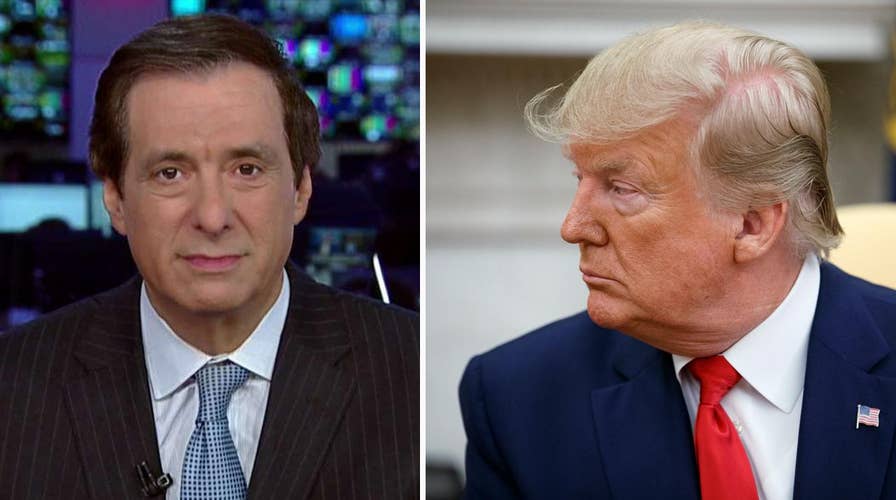Howard Kurtz: From Jeffrey Epstein to Kim Darroch, Trump does the distancing thing
'MediaBuzz' host Howard Kurtz weighs in on President Trump's responses to Kim Darroch's resignation and Jeffrey Epstein's indictment on sex trafficking.
When the British ambassador to Washington was caught disparaging President Trump in cables back to London, everyone knew what happened next would be rather undiplomatic.
The president Twitter-taunted “wacky” Kim Darroch, and said he’d refuse to deal with him, even though his job was to give candid advice, and he never intended the harsh assessments of Trump to become public. Sir Kim quickly resigned, saying it had become impossible for him to do his job.
But there was this telling line from the president: “I don’t know the Ambassador but have been told he is a pompous fool.”
Well, Trump did know Theresa May’s envoy, and had dealt with him in a number of meetings. It’s rather obvious that he was distancing himself from someone who was now trashing him.
The distancing thing is one arrow in the damage-control backpack, one that nearly every politician uses at one time or another. When a campaign donor turns out to be a crook. When a top aide writes a derogatory book. Or, as in the case of Jeffrey Epstein, when an old friend turns out to be a pedophile.
The distancers have been breaking speed records with Epstein, who has been charged with sex trafficking after a sweetheart deal approved by Labor Secretary Alex Acosta back in 2008 all but let him off the hook for having sex with young girls.
Trump told reporters he had a “falling out” with Epstein and hasn’t spoken to him in 15 years. (The New York Times reported that a business associate was to bring 28 young women to Mar-a-Lago for a “calendar girl” competition, and was surprised that the only attendees were to be Trump and Epstein.)
Bill Clinton rushed out a statement that he had flown on Epstein’s private jet only four times, and visited him only on a couple of other occasions.
In the Beltway culture, distancing is a fine and much-practiced art.
SUBSCRIBE TO HOWIE'S MEDIA BUZZMETER PODCAST, A RIFF OF THE DAY'S HOTTEST STORIES
The Washington Post says the Trump maneuver has become something of an insider joke among his advisers. With the Darroch dustup, “the rejoinder fit a familiar pattern for Trump, who is quick to minimize ties with people who criticize him or who find themselves facing an onslaught of negative attention that reflects poorly on the president.
“Among those who have gotten the ‘I barely know the guy’ treatment: Former acting attorney general Matthew G. Whitaker, conservative commentator Ann Coulter, former lawyer Michael Cohen, fired FBI director James B. Comey, former senior White House aide Stephen K. Bannon, former campaign chairman Paul Manafort, former State Department official Brett McGurk, longtime adviser Roger Stone, former White House aide Cliff Sims, former campaign aide George Papadopoulos and even the rapper Lil Jon, who starred on Trump’s reality TV show ‘Celebrity Apprentice.’”
That’s fair game. When Steve Bannon, who was Trump’s campaign chairman in the final stretch and White House senior adviser, left the fold, his ex-boss said: “Steve was rarely in a one-on-one meeting with me and only pretends to have had influence to fool a few people with no access and no clue, whom he helped write phony books.”
So the maneuver is executed not just with people who get mired in scandal but with those who suddenly turn on Trump. Remember Omarosa?
There are endless variations on the distancing act when an aide or confidant must be cut loose. I had no idea. Deeply disappointed. Just one of many advisers. If I had known I would have taken immediate action. I am demanding a full investigation.
CLICK HERE TO GET THE FOX NEWS APP
As a businessman accustomed to cutting his losses, Donald Trump may be more aggressive than most in curtailing political damage by minimizing past relationships. But he hardly invented the practice.













































